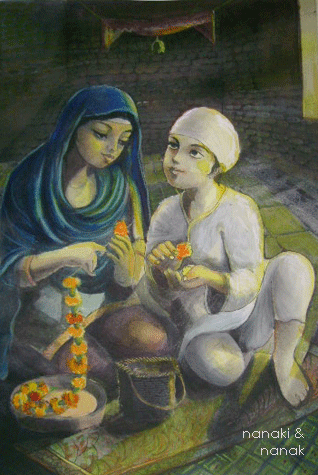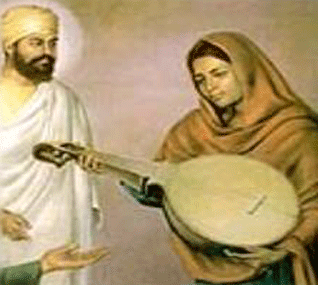Columnists
The Important Women Who Nurtured Nanak
Living Sikhi, Lesson Eleven
by VERONICA SIDHU
THE IMPORTANT WOMEN IN NANAK'S LIFE
Lesson Objectives:
1 To review the meaning of "tunn, munn and dhunn."
2 To understand how important Mata Tripta and Bibi Nanaki were to young Nanak's life.
3 To hear the story of Guru Nanak's marriage and why it was unusual.
4 To learn how wrong it is to tell lies or say mean things about others.
Teachers, ask the students to say the Sikh greeting with you; then fold hands and do simran with the students.
Going around the room, ask each student to tell the class what "tunn" ,"munn" and "dhunn" mean in their own life. Ask if anyone has learned the meaning of Naam Juppna, Kirt Karni, and Wund Chhukna?
Do you remember whom the boy Nanak's first teacher was? Pause for answer. Yes, it was Mata Tripta ji.
What was it that she taught him? Pause for answers. Right. She taught him his first words in Punjabi. She also taught him that he was loved. Experiencing our mother's love is the first opportunity we have to sense how much God loves us. Mata Tripta did a great job teaching the baby Nanak. She taught him many virtues by her example - by showing him how well she behaved, he would imitate her.
Do you remember the story of the good bargain? Who tried to protect Nanak and who explained to their father why Nanak made the choice to feed the hungry holy men? Pause. Right! It was his elder sister, Nanaki. She was the one person in the family who saw that Nanak's spirit was very pure. She protected him while he learned to balance his love of God with his worldly responsibilities, like watching the cattle. She is the one who understood how important prayer was and how focused meditation was most important in her brother's life, until he was able to keep his mind on God at all times, even while working.
She was married to Jai Ram, a petty officer in the service of the Nawab of Sultanpur. It was Nanaki who convinced her husband that her brother, Nanak, would do well in service of the Nawab, and it was her husband who helped to find the job of modi or store-keeper/ treasurer.
It was this sister who, after visiting the Brahmin priest, fixed the date of her brother's wedding to Sulakhni, daughter of Moola Chauna Randhawa of Pakhoke. In those days, many traditional holy men wanted to be closer to God, and wrongly thought that it would help them in this if they never married. Nanak was unusual. He said that living an ordinary life within the family is how to reach God. The key was to balance prayer, work and family life.
But even Nanaki could not stop the rumours that Nanak was out of his mind because sometimes he seemed lost in meditation - or that Nanak was stealing from the Nawab to give to the poor to get favours from them. In fact, some people told Sulakhni's father these lies. He was very worried about his daughter and hatched a plan to get rid of the fiancée. In his village was an old mud wall that was ready to fall down with the slightest push. He planned for Nanak to sit by the wall and have the girls of the village rush to meet him. In the crush, the wall would fall and Nanak would die. Then his daughter would be free to marry someone else.
An old woman stopped to see Nanak and told him of the plan. Nanak was unafraid. "No palace will survive forever, mother," he said to the woman. "If this mud wall is to crumble, it will not during this great occasion." It did not crumble that day. Even today, there is a glass wall around it. All the other sturdy houses are gone, but the mud wall survives!
Nanak's bride stood by him. Sulakhni and Nanak had two sons and both parents took care of the domestic duties of the family. When Nanak began his mission and traveled all over the world, it was his wife who took care of all of the financial and family duties. She was his main support because she herself had a great spiritual understanding of God's will and what God wanted her to do.
Because of the great example of the women in Guru Nanak's life, he praised women and said that recognized that are equal to men. "How can they not be equal to men if it is women who give birth to emperors?" he said.
Does anyone remember the names of the people who spread rumours and lies about young Nanak? No, because lies are false. The people who spread lies and rumours about other people do something bad. Even if these people believed what they were saying was the truth, would that make it ok? No, it does not make it ok, because no one can be sure if it is a lie or the truth. Not only that, saying bad things makes a bad atmosphere and hurts others. This is never good.
Homework:
Remember a time when someone said something bad about you. How did you feel? Write one good thing about yourself and then one good quality about someone who said something mean about you or to you. Try to find something good even in the meanest person.
Shabad: Jo maagay thakur upney tae sohe sohe deyvai
June 25, 2010
Conversation about this article
1: Sangat Singh (Kuala Lumpur, Malaysia), June 26, 2010, 3:01 AM.
I think it was in 1993. Principal Satbir Singh was in Kuala Lumpur. He was a close and dear, amazing friend. I spent as much time as possible listening to him. One day I asked him if he would relate for me the scene of Guru Nanak's 'aagman' - his divine birth - in his own voice. The next morning he wrote a brief script and we made a a rare recording in his own voice. I still have that treasured recording. It was the last time I was to see him. He passed away at Patiala on 18th August, 1994. He narrated how the birds broke into song and the flowers burst forth in full bloom. The cows and buffaloes produced unusually more milk. 'Sunee pukaar dataar prabh Guru Nanak jag mihae pathai' - "The Alimighty heard the cry of humanity, sent forth Guru Nanak." Who was the blessed person who first saw this divine child?. That honour went to Daultan Dai, a Muslim midwife. There was joy all around at the birth of the first son. When a beaming Mehta Kalu offered her the 'thaal' - salver - full of traditional gifts, she waved it away. In Satbir Singh ji's words, "Rehan daay Kalu, I am today utterly fulfilled. There is no need to give me anything. I have delivered hundreds of babies but none ever like him. He came smiling and there was a burst of mysterious light that filled the room. I am already the richest, blessed person today to witness the arrival of such a divine child." Bhai Gurdas has described that blessed arrival in his Vaars most beautifully. Who were the early ones besides Daultan who recognized the divine powers? It was Tulsan the maid when she tried to wake up Nanak who appeared to be asleep, by touching her tongue to his foot and was transported to a scene where Nanak was helping save a sinking boat. His elder sister Nanaki who Nanak always addressed as 'Bebey' was among the first to recognize that Nanak was no ordinary child and treated him more like 'Pir' rather than just a veer.




